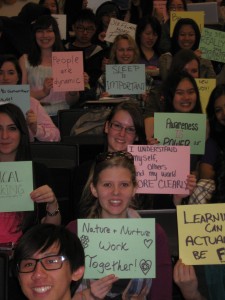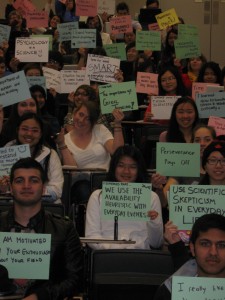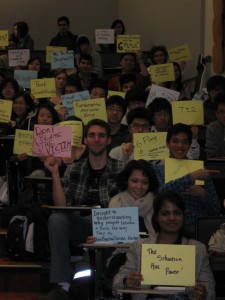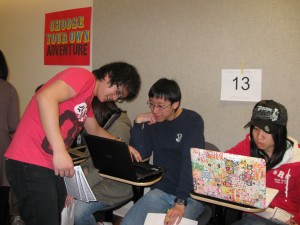Because I pour so much of my heart and soul, sweat and tears (never blood, yet anyway) into each course, I find it necessary to wait a while after a course is over to view the student evaluations of those courses. It can be very emotional to read them, full of breathtaking highs and, occasionally, devastating lows (I appreciate criticism, but not one worded disrespectfully). I have posted summary graphs of my scores and some commentary here, and will share some further reflections in this blog post. Links to all my course syllabi are available here.
The first thing I noticed was how students rated my introductory psychology course overwhelmingly positively. Those ratings are the highest I have ever received. This was absolutely thrilling! I had felt throughout the year a special rapport with this class, despite its large size (N=260). Their energy, curiosity and astute questions continually kept me on my toes, and this in turn fueled my own passion and excitement. I want to share with you a particularly thorough–and not 100% positive!–comment that might give you a feel for what to expect from me (if you’re shopping for courses):
At first, I didn’t like the way Catherine Rawn taught. She was a little too flamboyant and enthusiastic. I felt like she babied us a little. But as the year went on, I really began to appreciate it. I found that I paid attention even to the material I wasn’t particularly interested in. I appreciated her invitational office hour. I never would have gone to her were it not a “requirement,” and that was actually the point that caused me to like her better. I realized that she actually cares about her students (enough to LEARN OUR NAMES, which impressed me) and she was willing to be challenged and she was very respectful to students with opinions different than hers. I have to say that she is one of the better professors I have had in my first year of university. She was interesting, prepared, open, enthusiastic, and positive. She may have babied us a little, but only in the sense that she was so open to help. She still gave challenging and stimulating assignments. Overall, I would say, I thank her for doing a good job.
It’s an interesting comment, to me anyway, in part because it uses a term I’ve received in evaluations before: “babied.” This always intrigues me because I suspect it has something to do with people’s notions about what learning should look like in the university classroom: It should be serious! I attempt to infuse some fun in my courses (e.g., cheering!), I enjoy and find value in exploring with my students, and starting with the basics is important especially in an introductory course. My intention is never to baby, but I also want to dispel the notion that learning has to always be serious. Learning can be fun! Overall, I’m very pleased with the ratings of this course, and will not be making major changes to it next year… with one fabulous exception: the introduction of Peer Tutors! Ten fantastic “grads” of my course from last year have volunteered to help answer questions and act as role models as new students transition to my course and university more broadly. Looking forward to introducing them soon!
The second thing I noticed was that although my scores for Psyc 217 Research Methods are solidly and largely positive, I’m still having a challenge as students are perceiving my evaluations to be less fair than is average across campus (though not unfair per se; see the means on my “evaluating teaching” page, linked above). It is possible that this is simply perception given that this is a very tough course (which is true for all Psyc 217 sections), as it should be because it provides the foundation for all further study in psychology and other behavioural sciences. Yet it’s also possible that my evaluations are in fact less fair than is average across campus. In order to address this consistent rating, I am vowing to critically re-evaluate my exams and assignments this fall. One of those, the group research project, is common to all sections and has a common grading key/rubric, so there’s little to change there. My action plan for evaluating my exams and assignments is to gather all my learning objectives together from every lesson of the course, as well as the broader course objectives stated in the syllabus, and the readings for each unit. I will then consider every question on every evaluation, specifically in terms of how well it links to one or more objectives. Then I will consider whether any question isn’t measuring any objective, and toss it. Then I will consider whether any objective isn’t being addressed, and consider whether the objective should be changed/tossed or measured. After I conduct this analysis of content validity, I will use data from previous years (as I often do) to inform changes to the individual questions to improve their ability to accurately measure learning in my course. I expect my students to use my stated objectives as a road map; it’s time to re-check that they’re aligned with the way I’m evaluating that learning.
Third, I was pleased to see that my scores for Psyc 208 Section 2: How Social Psychology Can Help You Succeed (Special Topics) have improved much from the first time I offered it in 2009, as I used the feedback from 2009 as well as inspiration from a talk by Michael Wesch last summer to make substantial changes. It’s an unconventional course, with lots of teamwork and interaction. For one, I implemented the validity analysis process for exams I explained above (for Psyc 217), which resulted in much fairer exams. As for improvements based on this year’s feedback, I will shorten the midterm a little, and make some small adjustments to the grading of the team project so that individual work related to the team project is weighted more heavily relative to the team grades. Also, I’m considering making grading keys available for the team assignment to improve the clarity of what’s expected for each. Given this feedback, I’d like to share one of my favourite comments from this course, because it reflects my intention in creating this course and in how I structure each and every lesson/experience. Of course they’re not all this positive, but indulge me:
Easily the best teacher I have had at UBC. She should hold workshops for other professors! Or publish a book, or work w ith the Chapman Learning Commons to develop a free, non-credit version of the course that students can take to learn how to improve their university experience. I would recommend her course in Social Psychology and its application to academic success to any student regardless of faculty or major and consider it an invaluable tool to my success. Catherine was always helpful, expected the best of her class and demonstrated an unparalleled concern for the personal and academic development/wellbeing of her students.

 Follow
Follow



